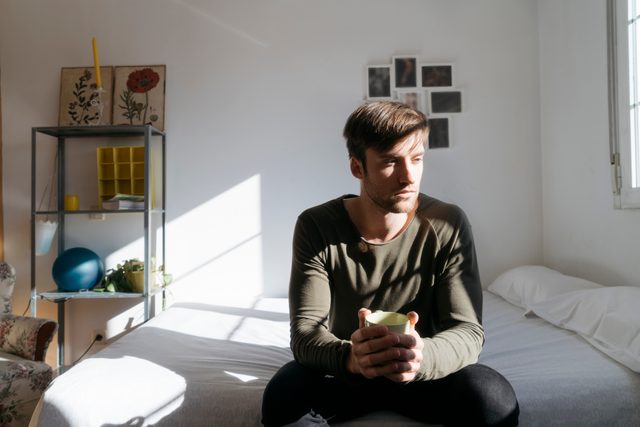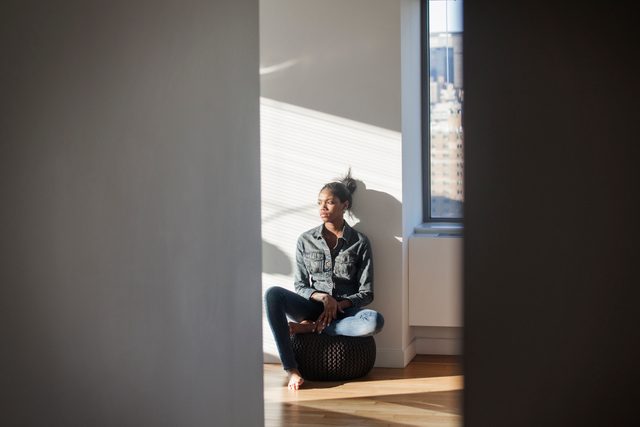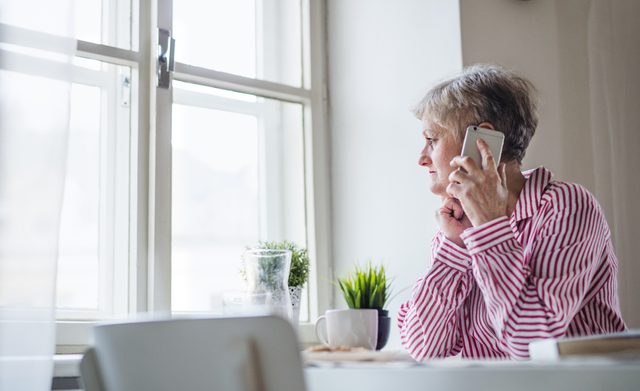How to Keep Loneliness and Isolation from Harming Your Health
Updated: Mar. 16, 2022
Social distancing is slowing Covid-19's spread but the enforced solitude may raise other risks.
Our editors and experts handpick every product we feature. We may earn a commission from your purchases.
With the novel coronavirus spreading across the United States, public health officials and political leaders have called for people to stay home and avoid contact with others. “Social distancing,” as it’s called, saves lives during a pandemic. But social isolation and the loneliness it can cause can hurt your health.
On January 19, the first known U.S. case of Covid-19, the disease caused by the coronavirus, popped up in the state of Washington. On January 31, the Secretary of Health and Human Services declared a public health emergency. As the highly contagious disease spread across America, cities, states, and counties started telling people to stay home, and on March 13 President Trump declared a national emergency. Since then, leaders across the country have put recommendations in place to limit social interaction, everything from rules about the size of gatherings to measures like telling people to “shelter in place.” (That hasn’t stopped everyone though—here are some of the worst super spreader events since the start of the pandemic.)
Officials say that those measures will prevent the disease from spreading, but unfortunately, they worsen another growing public health issue in the United States: the epidemic of loneliness.
When Vivek Murthy, MD, was appointed U.S. Surgeon General in 2014, he toured the country asking people about their health concerns. He expected to hear about “the opioid epidemic and rising rates of obesity, diabetes, and heart disease,” he writes Together, an upcoming book about loneliness. But in addition to those things, he also heard that loneliness is “far more common than I had thought,” he tells The Healthy. “I also came to learn that it was more consequential in having significant impacts on our health.”
More and more of us are isolated
A higher proportion of Americans are living alone and spending time alone than in past decades. More than a quarter of U.S. adults live alone, according to the U.S. Census Bureau. A third of U.S. adults over 45 reports being lonely. Less than half of U.S. adults participate in an organized religious group and less than a quarter participate in a social club or a local sports league. And the problem has been getting worse. According to the latest U.S. Census, more than a quarter of households consist of just one person, up from under 15 percent in 1960. The average size of social networks has decreased by one third over a similar period, according to Pew Research. Volunteerism, another measure of community involvement, is also down, according to the Bureau of Labor Statistics. The problem may be more acute for older Americans: AARP estimates that some eight million Americans over 50 “are affected by isolation.”
It sounds bad, but, after all, some people like being alone, and we all have to do it sometimes, so what’s the problem? According to a widely reported 2015 analysis of studies, called a meta-analysis, 3.4 million people around the world, being socially isolated, feeling lonely and living alone corresponded with an increased risk for mortality by 29 percent, 26 percent, and 32 percent respectively.
[Do you have a story to share about coronavirus? Click this link to share your Covid-19 story with us.]
According to a recent review of the literature published by Julianne Holt-Lunstad, MD, professor of psychology and neuroscience at Brigham Young University and the lead author of that study, “lacking social connection carries a risk that is comparable, and in many cases, exceeds that of other well-accepted risk factors, including smoking up to 15 cigarettes per day, obesity, physical inactivity, and air pollution.”
In this new era of “social distancing” and “shelter-in-place” orders, how can you tell if you’re at increased risk, and what can you do about it?

Loneliness vs. social isolation
The 2015 metastudy noted three risk factors: Feeling lonely, being socially isolated, and living alone. We all know what the third one is, but what do the first two mean?
“Loneliness is the subjective feeling of being alone,” Dr. Holt-Lunstad tells The Healthy. “It’s defined as the discrepancy between one’s actual level of social connection and one’s desired level of social connection.”
Think of the phrase “alone in a crowd”—you can be surrounded by people and still feel lonely. Conversely, you can be alone but not feel the need for social interaction; you’re not lonely.
Social isolation, on the other hand is, “having few relationships and infrequent social contacts,” Dr. Holt-Lunstad says, adding, “someone who is isolated is at greater risk at becoming lonely, but you can be lonely and not isolated and isolated and not lonely.”
Since loneliness is a feeling, it’s not something that’s easily measured. But two recent surveys try to shed light on just how many Americans are lonely. The Kaiser Family Foundation, which studies health policy, found that about one in five Americans are lonely, while health insurer Cigna found that three out of five Americans are lonely.
Despite the discrepancy between survey results, Dr. Holt-Lunstad says, together they suggest that “a significant portion of the population is reporting that they’re lonely.” Further, in both surveys, those under 50 reported higher levels of loneliness than those over 50, with Generation Z showing the highest levels of loneliness out of all groups, followed by Millennials.
Social isolation is harder to measure but doctors who study it cite the proportion of Americans who live alone, a little more than one in four, according to the U.S. Census.
Negative health effects
Researchers have long posed theories why living alone may cause an increased rate of mortality: When you live alone, you are less likely to be reminded to observe good habits, like eating right and exercising. You might also be less likely to have a serious medical condition attended to immediately, like a stroke or heart attack.
“From the time we’re little, we have people who encourage us to eat our veggies, to look both ways. Throughout our lifetime we have people who are looking out for us, encouraging us to get more sleep, to go see a doctor, to remind us to take our medications,” says Dr. Holt-Lunstad.
What is less understood is why loneliness increases your chance of dying. One of the pathways is the heart.
Humans are social beings, Dr. Holt-Lunstad explains. Throughout history, people have adapted to be a part of a group, for protection from predators or the elements, but also to get resources like food and shelter more efficiently. “Our brains have adapted to expecting others around,” she says. “When we lack proximity to others, in essence we need to be more vigilant to threats in our environment. We use more metabolic resources when we’re alone than when we’re with others. So when we lack this proximity to others, our bodies are in a heightened state of alert, and this can affect peripheral systems like cardiovascular, as well as circulating stress hormones.”
When this happens over a short period of time, it can help us escape danger or react appropriately to a situation, without causing damage to our bodies. But when experienced over a long period of time, it can cause damage to the cardiovascular system.

What can we do about it?
The epidemic of loneliness is compounded today by the coronavirus pandemic. When it comes to public health, the latter trumps the former—but loneliness and isolation aren’t going away.
“We already know we had a loneliness problem in the United States and around the world, and now we’re asking people to stay by themselves,” Kelli Harding, MD, assistant clinical professor of psychiatry at Columbia University Irving Medical Center in New York City, tells The Healthy. She’s the author of a new book The Rabbit Effect, which dives into how to improve health outcomes through positive social connections. Bt according to research, there are things we can do to mitigate the negative health effects.
Shift your perception
“You could appraise your situation as being trapped or forced to stay home, or you could change your appraisal to thinking about this as ‘this is something I’m doing to protect the ones I love’,” says Dr. Holt-Lunstad. A recent Harvard study of coronavirus-related isolation in Italy suggests that instead of orders to stay home, public health messaging be framed to stress ways that staying home is desirable for public health.
The perception of being supported, even if you are living alone or feeling lonely, such as believing you have someone you could call in an emergency, has been shown in the laboratory to increase rates of survival, according to Dr. Holt-Lunstad.
“We should be a force of social support to those around us,” says Dr. Holt-Lunstad, which would confer that benefit.
Look to support others
Helping care for someone, an animal or even a plant can help reduce the feeling of loneliness and improve survival rate. “When we help other people, we establish a connection with them. It reaffirms to us that we have value to add to the world,” says Dr. Murthy, the former surgeon general. “When we are lonely, one of the ironic things that happens to us is that we actually move into an elevated threat state, and in that elevated threat state, we are more likely to perceive danger around us, which can make social interaction harder and it makes us more likely to focus on ourselves. This is why service is really powerful: It short-circuits those mechanisms and breaks the negative downward spiral. It shifts our focus from ourselves to someone else and reaffirms to us that we do have value and that we are not unlikable or unworthy.”
This mental trick can work even by taking care of a pet or a plant, according to Dr. Murthy. A classic 1976 study of two groups of nursing home patients—one that was given the responsibility of taking care of a plant and another that was given a plant that was taken care of by nursing home staff—showed that the former group reported many positive effects, including an increased sense of well-being.

Reach out to old friends
Another step you can take is to connect with people in your life who you haven’t reached out to in a while.
“Take a couple of minutes to put everything away and make a phone call that’s important to you,” says Dr. Harding. “These connections get you through the tough times, and we’re all feeling this collective loss, we’re all in this together.”
This act of support will not only enrich your life but will help others feel supported, which will help them as well. Spending at least 15 minutes a day connecting deeply with someone in your life—calling them on the phone, videoconferencing them, or writing a letter—“can be remarkably powerful in making us feel more connected and reminding us that we have good connections in our lives,” says Dr. Murthy.
Really listen
Dr. Murthy also recommends making sure these interactions have our full attention. “The greatest gift we can give people is the gift of our full attention,” he says. “That means not just sharing but listening and listening deeply.”
A lot of the advice doctors and researchers give may fall into the “simple but not easy” camp. When feeling lonely or down, it can be challenging to approach some of these tasks, but acknowledging that they are helpful may increase your likelihood of doing them.
Dr. Murthy’s prescription for a healthier America?
“If I had to sum up the credo of the book and how I think about this issue, it would be: put people first. It’s as much a guide to our individual lives as a directive as to how we should shape our culture.”
Dr. Harding, whose book is primarily about how kindness can help us live happier, longer and healthier, put it this way: “Crisis aside, if we all saw each other more as complete human beings, we’d all be a lot kinder.”













